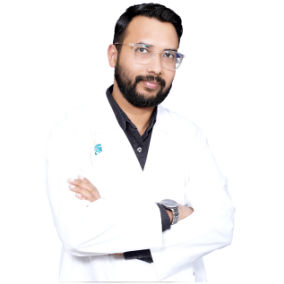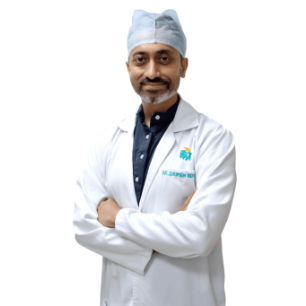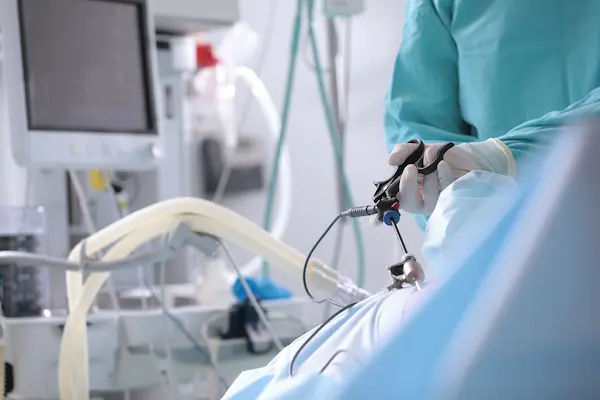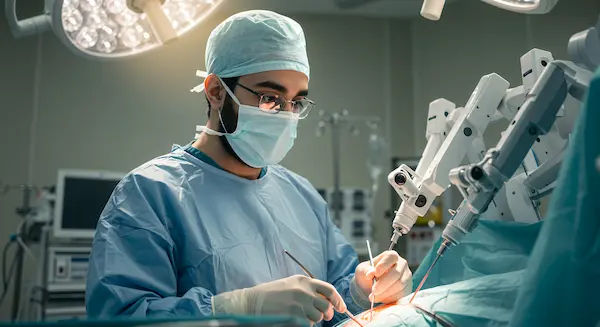Hernia Explained: Signs, Causes, and Your Treatment Options
Know about the hernia, signs, causes, symptoms, types, treatment options and prevention of hernia

.webp?tr=q-80,f-webp,w-350,dpr-2,c-at_max 700w)
Introduction
That mysterious bulge or twinge of pain in your abdomen or groin can be worrying. You might be wondering if it’s a pulled muscle or something more serious, like a hernia. Simply put, a hernia occurs when an organ or fatty tissue squeezes through a weak spot in a surrounding muscle or connective tissue. While some hernias cause no trouble, others can lead to significant discomfort and require medical intervention. This comprehensive guide will walk you through everything you need to know, from identifying the signs of a hernia and understanding what causes them to exploring the latest and most effective treatment options available.
What is a Hernia? A Simple Definition
A hernia is a medical condition characterised by the protrusion of an organ or tissue through an abnormal opening in the muscle wall that normally contains it. Imagine an inner tube pushing through a weak spot in a worn-out tire—the principle is similar. The most common types involve the abdominal wall, where parts of the intestine or abdominal fat push through a weakened area, creating a noticeable bulge.
Consult a Gastroenterologist for Personalised Advice
The Basic Anatomy of a Hernia
Every hernia has three key components:
1. The Sac: The lining of the cavity (peritoneum) that bulges out.
2. The Contents: What is inside the sac, often a loop of intestine or abdominal fat (omentum).
3. The Coverings: The layers of the abdominal wall that the sac pushes through.
How Common Are Hernias?
- Hernias are extremely common. It's estimated that over 20 million hernia repairs are performed globally each year. Inguinal hernias are by far the most prevalent, accounting for about 70% of all cases, and they are significantly more common in men than in women.
Recognising the Signs: Common Hernia Symptoms
Many people discover a hernia by accident, often while bathing or lifting a heavy object. The symptoms can vary from nonexistent to severe.
The Most Telltale Sign: A Visible Bulge
The hallmark sign of a hernia is a visible lump or bulge under the skin. This bulge might:
- Appear when you stand, cough, or strain. Disappear when you lie down. Feel soft and may be pushed back in initially.
From Discomfort to Pain: The Sensation of a Hernia
Not all hernias are painful, but many cause sensations like:
- A feeling of heaviness, pressure, or weakness in the abdomen or groin.
- A dull ache or sharp pain that worsens with activity (lifting, bending, coughing) and improves with rest.
- A burning or gurgling sensation at the bulge site.
When to Seek Immediate Medical Attention?
A strangulated hernia is a life-threatening complication where the blood supply to the herniated tissue is cut off.
Go to the emergency room immediately if you experience:
- Sudden, severe pain and tenderness at the bulge site.
- The bulge turns red, purple, or dark.
- Nausea, vomiting, or fever.
- Inability to pass gas or have a bowel movement (signs of obstruction).
What Causes a Hernia? The Leading Factors
A hernia doesn't have a single cause; it results from a combination of muscle weakness and increased pressure.
Muscle Weakness: The Primary Culprit
Weak spots in the muscle wall can be present from birth (congenital) or develop later in life. Common causes of weakness include:
- Age and natural wear and tear.
- Injury or trauma to the area.
- A surgical incision that doesn't heal properly (leading to an incisional hernia).
Pressure and Strain: The Triggering Event
Weak muscles may never cause an issue until pressure forces tissue through them. This pressure can come from:
- Heavy lifting: Especially without using proper technique.
- Chronic coughing or sneezing: From conditions like COPD or allergies.
- Straining during bowel movements or urination.
- Pregnancy: Which places increased pressure on the abdominal wall.
- Obesity: Excess weight strains the body's musculature.
- Fluid in the abdomen (ascites).
Types of Hernias: Where They Can Occur
Based on the location, it can be divided into:
Inguinal Hernia (Groin)
- The most common type (~70%) occurs when tissue (often intestine) protrudes through a weak spot in the lower abdominal muscles, often into the inguinal canal. They are much more prevalent in men due to a natural weakness in this area related to testicular descent.
Hiatal Hernia (Upper Stomach)
- This type involves the stomach bulging up through the diaphragm into the chest cavity. It's often associated with gastroesophageal reflux disease (GERD), as it can weaken the valve between the oesophagus and stomach, leading to heartburn and acid reflux.
Umbilical Hernia (Belly Button)
- Occurs when part of the intestine pushes through the abdominal wall near the navel. Common in newborns, they often close on their own by age 4. In adults, they can be caused by obesity, multiple pregnancies, or abdominal fluid.
Incisional Hernia (Site of Surgery)
- It can develop as a complication of abdominal surgery, where the intestine pushes through the scarred incision or weakened surrounding tissue.
Other Less Common Types
- Femoral Hernia: A rarer type that appears as a bulge in the upper thigh, just below the groin. More common in women.
- Epigastric Hernia: Occurs between the navel and breastbone, involving fat pushing through the abdominal wall.
Hernia Treatment: From Watchful Waiting to Surgery
Non-Surgical Management (Watchful Waiting)
- If the hernia is small, reducible, and not causing symptoms, a doctor may recommend watchful waiting. This involves monitoring for changes but not intervening immediately. Lifestyle changes, like weight loss or avoiding heavy lifting, may be advised to prevent progression.
Hernia Trusses and Supports: Do They Work?
- A truss is a supportive garment designed to hold a hernia in place. While sometimes used for temporary comfort, doctors generally do not recommend them as a long-term solution. They do not cure the hernia and can even cause complications by adhering to the tissue or weakening the surrounding muscles further. Always consult a doctor before using one.
Surgical Repair: The Definitive Solution
- Surgery is the only way to permanently repair a hernia. It is recommended that the hernia is growing, painful, or presents a risk of strangulation. The two primary surgical approaches are:
Open Hernia Repair (Herniorrhaphy)
- A surgeon makes a single incision over the hernia site, pushes the protruding tissue back into place, and then repairs the weakened muscle wall by sewing it shut. Often, a synthetic mesh is implanted to reinforce the area and significantly reduce the risk of recurrence.
Laparoscopic Surgery (Minimally Invasive)
- The surgeon operates using a tiny camera (laparoscope) and specialised instruments inserted through several small incisions. This approach offers benefits like less post-operative pain, smaller scars, and a faster recovery compared to open surgery.
Robotic-Assisted Hernia Repair
- Similar to laparoscopic surgery, but the surgeon controls robotic arms from a console. This can allow for enhanced precision, particularly for complex or recurrent hernias.
Recovering from Hernia Surgery: What to Expect
- Recovery varies by the type of surgery and the individual. Generally, for laparoscopic repairs, patients can return to light activities within a week or two. Full recovery, including the ability to resume heavy lifting and strenuous exercise, may take 4-6 weeks. Your surgeon will provide specific instructions on wound care, pain management, and activity restrictions to ensure optimal healing.
Can You Prevent a Hernia? Mitigating Your Risk
While you can't change genetic predispositions, you can reduce your risk:
- Maintain a healthy weight to reduce pressure on abdominal muscles.
- Eat a high-fibre diet (fruits, vegetables, whole grains) to prevent constipation and straining.
- Lift objects properly by using your legs, not your back, and avoid lifting weights beyond your capability.
- Stop smoking to prevent the chronic cough that strains abdominal muscles.
- See a doctor for persistent coughs or sneezes.
Conclusion
Understanding the hernia definition, its signs, and underlying causes empowers you to take charge of your health. While the thought of a hernia can be daunting, it's important to remember that it is a highly treatable condition. Modern surgical techniques have made hernia treatment safer and recovery faster than ever before. If you suspect you have a hernia, don't ignore it. Schedule a consultation with your doctor or a general surgeon for a proper diagnosis.
Consult a Gastroenterologist for Personalised Advice
Consult a Gastroenterologist for Personalised Advice

Dr. Jatin Yegurla
Gastroenterology/gi Medicine Specialist
11 Years • MD (PGI), DM (AIIMS Delhi), FAGIE (AIIMS Delhi), ESEGH (UK), Gold Medalist
Hyderabad
Apollo Hospitals Jubilee Hills, Hyderabad
(650+ Patients)

Dr. Chethan T L
General Physician/ Internal Medicine Specialist
5 Years • MBBS, MD, DNB (General Medicine)
Bengaluru
Apollo Medical Center, Marathahalli, Bengaluru

Dr Piyush Vishwakarma
Gastroenterology/gi Medicine Specialist
11 Years • MBBS, MD, DrNB,
Delhi
Apollo Hospitals Indraprastha, Delhi

Dr. Aakash Garg
Gastroenterology/gi Medicine Specialist
12 Years • MBBS, DNB (Medicine), DrNB (Gastroentrology).
Bilaspur
Apollo Hospitals Seepat Road, Bilaspur
(150+ Patients)

Dr. Soumen Roy
Minimal Access/Surgical Gastroenterology
18 Years • MCh (AIIMS, Delhi) (GASTRO-ONCO HPB LIVER TRANSPLANT). FELLOW LIVER TRANSPLANT KAROLINSKA INSTITUTE (SWEDEN) CONSULTANT - LAPAROSCOPIC & ROBOTIC SURGICAL GASTROENTEROLOGIST & LIVER TRANSPLANT SURGEON.
Bhubaneswar
Apollo Hospitals Old Sainik School Road, Bhubaneswar
(150+ Patients)
Consult a Gastroenterologist for Personalised Advice

Dr. Jatin Yegurla
Gastroenterology/gi Medicine Specialist
11 Years • MD (PGI), DM (AIIMS Delhi), FAGIE (AIIMS Delhi), ESEGH (UK), Gold Medalist
Hyderabad
Apollo Hospitals Jubilee Hills, Hyderabad
(650+ Patients)

Dr. Chethan T L
General Physician/ Internal Medicine Specialist
5 Years • MBBS, MD, DNB (General Medicine)
Bengaluru
Apollo Medical Center, Marathahalli, Bengaluru

Dr Piyush Vishwakarma
Gastroenterology/gi Medicine Specialist
11 Years • MBBS, MD, DrNB,
Delhi
Apollo Hospitals Indraprastha, Delhi

Dr. Aakash Garg
Gastroenterology/gi Medicine Specialist
12 Years • MBBS, DNB (Medicine), DrNB (Gastroentrology).
Bilaspur
Apollo Hospitals Seepat Road, Bilaspur
(150+ Patients)

Dr. Soumen Roy
Minimal Access/Surgical Gastroenterology
18 Years • MCh (AIIMS, Delhi) (GASTRO-ONCO HPB LIVER TRANSPLANT). FELLOW LIVER TRANSPLANT KAROLINSKA INSTITUTE (SWEDEN) CONSULTANT - LAPAROSCOPIC & ROBOTIC SURGICAL GASTROENTEROLOGIST & LIVER TRANSPLANT SURGEON.
Bhubaneswar
Apollo Hospitals Old Sainik School Road, Bhubaneswar
(150+ Patients)


.webp)

